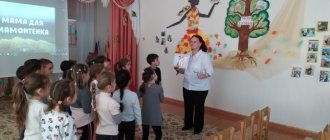Workshop for teachers “Optimizing interaction with parents”
Workshop with elements of training for teachers “Optimizing interaction with parents”
Target:
optimization of interaction between teachers and parents.
Family and kindergarten are two social institutions that stand at the origins of our future, but often they do not always have enough mutual understanding, tact, and patience to hear and understand each other. This can happen for various reasons.
Subjective reasons act, as a rule, on the part of both educators and parents. These include unjustifiably positive or unjustifiably negative expectations of parents from a preschool institution. An unjustifiably positive attitude arises when parents, sending their child to kindergarten, begin to live in a certain myth that “kindergarten will teach you everything,” and their main responsibility now is to ensure the material existence of their child. Negative relationships can arise from previously received negative experiences of interaction with the preschool institution of parents or their acquaintances.
Another reason for conflicts is related to the fact that the teacher sometimes becomes a symbol of power for parents, a kind of controller who evaluates their actions and teaches them. And when the teacher talks about the child, makes some recommendations, the parent very often mistakenly believes that they are evaluating him, his worth as a person and a parent. Moreover, as it turns out, educators have a similar situation when they perceive parents as some kind of inspectors who go around every day and check their work.
When you approach educators, many speak out about the difficulties of working with parents. Indeed, all parents are different, they are adults, and each one needs to find a certain approach. Thus, some teachers admit that they “show off” in front of their parents, because unsure of how to talk to them correctly, so as not to say too much and present information about the child in the right way.
Our preschool institution is constantly working to optimize the interaction between teachers and parents, but it has become clear that teachers need to develop a specific practical skill. In this regard, we conducted a workshop with elements of training, which helped our teachers cope with many problems that arise when communicating with students’ parents and establish this relationship.
Thanks to this work, we are achieving positive dynamics in solving the stated problem, which is why we want to share our development with everyone who is also working in this direction.
GREETING (state, mood)
Exercise “A minute to talk” (10-12 min)
Target:
cohesion of the group, creation of a positive emotional atmosphere and work environment.
The training participants are divided into two teams and sit in two circles (the inner one remains motionless). Members of the outer circle, having completed the conversation task, move to the next participants to continue the conversation. Topics of conversation: weather, children, love, work, home, fashion, tomorrow, vacation, upcoming holiday.
Exercise “Searching for common ground” (5-6 min)
Target:
cohesion of the group, creation of a positive emotional atmosphere and work environment.
The group is divided into twos, and two people find a certain number of common features, then the twos unite into fours for the same purpose, etc. The presenter, at his discretion, can stop the process at fours, eights, etc.
Questionnaire (to be completed before the seminar).
Target:
the mood to work on the topic of the seminar, obtaining pedagogical reflective experience, experience of interaction in a group, experience of representing the interests of the entire group.
The reason for the difficulties in interaction between educators and parents:
- Insufficiently high level of psychological and pedagogical culture of parents.
- Insufficient competence of many educators.
- Incomplete awareness of educators about the child’s living conditions at home and, accordingly, parents about the child’s life in kindergarten.
- The attitude of educators towards parents as objects of education.
- The desire of educators to avoid “live” communication, to replace it with questionnaires and information stands.
- “Closedness” of the preschool institution.
- Low social status of the teaching profession in society.
Job:
We divide into three groups, each taking two identified REASONS for analysis (by drawing lots) (we work with questionnaire materials).
Finding ways to overcome difficulties (standard, non-standard, complex work of the kindergarten as a whole, private work of each teacher, etc.).
Group performance.
Joint analysis of question 7.
The teachers’ task is to fill out the tables on the questions given to them:
- justify the influence of reasons (in favor of “Yes or “No”)
- find solutions (what can be done?):
Insufficiently high level of psychological and pedagogical culture of parents.
| Yes: | No: |
| Ways to overcome: | |
In a similar way, it is necessary to work out all seven (or each preschool educational institution has its own) stated reasons for the difficulties in interaction between educators and parents.
The result of participation in the seminar for teachers of MBDOU d/s “Yablonka”, 2015:
Insufficiently high level of psychological and pedagogical culture of parents.
| Direct influence of the cause: | Indirect influence of the cause: |
| The parents are young, inexperienced, ill-mannered, unrestrained. They consider their opinion to be the only correct one and at the same time do not know the age characteristics of children. They don't want to listen. They avoid problems, engage in self-deception, pretend that everything is fine (“they will outgrow”). A special category of financially secure parents who are willing to pay others rather than educate themselves. Stubborn insistence on one’s “false” (from a pedagogical perspective) point of view. | What is important is not so much psychological and pedagogical culture as good manners (social culture). Improving the psychological and pedagogical culture of parents is the task of educators and preschool educational institutions. |
| Ways to overcome: Every year at parent meetings, in an accessible form (in non-standard ways, using diagrams, cards), explain to parents what children should be able to do by the end of the year; Give parents home consultations on issues that interest them, or on topics that they need to pay attention to, in the teacher’s opinion, and be sure to talk about the material the parents have read; Demonstrate parts of classes or routine moments in which a parent can clearly see their child’s abilities; Invite a parent on a regular weekday in order to directly observe the child’s activities in the group during the day; Individual conversations with parents (technique: “do you want us to help you?..”). | |
Insufficient competence of many educators.
| Direct influence of the cause: | Indirect influence of the cause: |
| A set of personal qualities and attitudes that interfere with constructive interaction (unjustified persistence, rigidity, rudeness, etc.). The young contingent of teachers does not have sufficient experience and sometimes knowledge. Lack of desire to delve into the essence of conflicts and understand controversial issues. | Competence is not so important as personal motivation in the profession (love for what one does). |
| Ways to overcome: Conducting and participating in communication trainings; Work on yourself, self-improvement. | |
Incomplete awareness of educators about the child’s living conditions at home and, accordingly, parents about the child’s life in kindergarten.
| Direct influence of the cause: | Indirect influence of the cause: |
| Educators have access to only the information that the parent reveals; some of the information is often hidden by parents. Parents have little interest in their child's life in kindergarten. | |
| Ways to overcome: Questionnaire; Conducting round tables, open days, tea parties, casual conversations; Give homework assignments, finish work at home together with the children, work started in kindergarten; Creating and maintaining traditions in the group; Organizing club activities, exhibitions, open viewings of classes, theater Fridays, thanking each parent (make the parent feel needed); | |
The attitude of educators towards parents as objects of education.
| Direct influence of the cause | Indirect influence of the cause |
| The teacher's edifying tone and constant complaints about the child's behavior in kindergarten. Parents consider themselves to know their own children well enough (“like no one else”), and are often sensitive to criticism and recommendations because of their ambitions. | The teacher does not try to teach the parent and show his literacy; he needs to help the child, which is what he encourages parents to do. |
| Ways to overcome: Complain less about the child, start the dialogue with positive information and smoothly move on to the problem; Change the dialogue in such a way that the parent himself suggests ways out of the current situation, and the teacher tactfully adjusts the proposed ideas (“what is your opinion?, You say wonderful things, What do you suggest?”). | |
The desire of educators to avoid “live” communication, to replace it with questionnaires and information stands.
| Direct influence of the cause | Indirect influence of the cause |
| Avoiding communication brings misunderstandings and false assumptions on both sides. (Reasons may be: embarrassment, lack of time, reluctance to give negative information about the child) | |
| Ways to overcome: Conducting circle activities, group work with the obligatory use of active forms, conducting joint classes, creative evenings, tea parties, informal meetings; Involving parents who do not want to take part in the life of the group, conflicting parents in carrying out tasks on behalf of the parent committee, assigning them responsibility for certain activities; Individual confidential conversations Identifying the wishes of parents and involving them in creating conditions for the implementation of put forward ideas to improve the work of the group. | |
“Closedness” of the preschool institution.
| Direct influence of the cause | Indirect influence of the cause |
| Conducted public reports regarding the activities of preschool educational institutions are not always clear to parents; they avoid this information, because misunderstand her. | The “desire” to participate in the life of the kindergarten depends on the parents. |
| Ways to overcome: Conducting meetings with parents in interesting, non-traditional, relaxed forms; Creating and maintaining traditions in the group; Personal motivation of the teacher in the events held by the preschool educational institution, “construction” of these events in front of parents, increasing the importance of the preschool educational institution’s activities in front of the parent. | |
Joint analysis of question 7:
The psychologist writes down the group’s answers to the question on whatman paper (on the board) with a marker in the form of a brainstorm: What does the status of an educator (teacher) consist of (what does it depend on).
On whom does each of the listed qualities depend?
(from each of us, bring to the thought “the status of the educator depends on the educator himself”).
“Development of basic communication skills” (10 min).
You need to enter an imaginary locker room and greet the parents and attract attention without verbal communication, and then contact the parent using various techniques (request, demand, complaint, warning, praise, joke, question, hint, wish, recommendation, etc. .). It is necessary to find not only the right intonations, but also the plasticity of facial and pantomimic intonation, the correct body position (monitor muscle freedom and relieve excessive muscle tension).
You must be prepared to react in unexpected situations (for example: entering the locker room, you are witnessing a conflict between parents, a conflict between a parent and a child).
"Point of View" (10 min)
Participants are divided into pairs. They are given a topic of communication, but one of them defends one point of view (“for”), the other the opposite (“against”).
The task is to persuade the opponent to your point of view on a certain issue. Possible topics:
“Mom teaches you to give back, the teacher teaches you constructive ways of interacting”;
“The teacher recommends that the child be demanding in performing cultural and hygienic skills (dressing/undressing, etc.) the mother says, “he is still small, we feel sorry for him”;
“You are biased towards my child,” the teacher gives recommendations for correcting the child’s behavior;
“You answered me “dryly” - “what are you, it seemed to you, I’m an introvert by nature.”
“You answered me rudely” - it seemed to you that this was how the circumstances developed and you, without listening to the end, understood everything wrong.
“The teachers are opposed to our family and our child, you constantly send us to a speech therapist, then to a psychologist, is our child the worst?” — the teacher gives recommendations on how to correct gaps in the development of behavior and cognitive processes;
“You never give my child roles in matinees and holidays, is he the most incapable?” - the child really can’t handle it.
Analysis:
in fact, work with objections is underway.
- Who accepts with satisfaction the change in their point of view? Nobody.
— What techniques can make this process smoother?
The main principle is not to fight (the struggle of positions leads to a dead end).
As an example, do the following exercise:
Exercise for teachers “Hands”
The presenter asks to join the palms of the hands at chest level, and then press the right palm onto the left.
From the experience of carrying out this exercise, it is known that the left hand unconsciously begins to offer resistance, although such instructions or demonstration of such actions are not given by the leader.
Ideas for discussion:
In response to pressure, we subconsciously begin to resist, that is, any directive gives rise to resistance.
If the teacher is unfriendly, it is noticeable and parents unconsciously take protective measures.
Exercise “Last meeting” (10 min).
Target:
improving communication culture, completing the group.
Classes are already over. But did you have time to say everything? Maybe you forgot to share your experiences with the group? Or is there a person whose opinion about you you would like to know? Or do you want to thank someone? Do it here and now.
Exercise “Through the Ring”.
Target
: Coordination of joint actions, unity, training of confident behavior in a situation when someone needs to put forward ideas, take on leadership functions.
Participants stand in a line, holding hands, the guide holds a gymnastic hoop in his free hand (you can pre-make a ring with a diameter of about 1 m from wire, paper, etc.). The participants’ task: without opening their hands, “leak” through this ring so that it ultimately ends up at the other end of the line. You can pass the ring, or you can, on the contrary, move yourself, crawling through it.
Discussion
: What helped you complete the exercise, and what, on the contrary, hindered you? Was the task carried out according to some plan, or did everyone act on their own initiative? How to improve the method of passing the hoop?
Literature
- Volik, I.G. Workshop with elements of training for teachers “Optimization of interaction with parents” [Electronic resource] / I.G. Volik. – Access mode: https://festival.1september.ru/articles/585463/.



